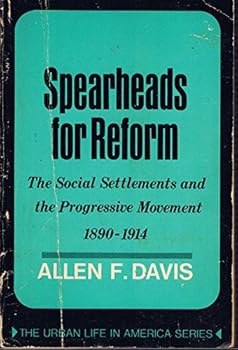Spearheads for Reform
No Synopsis Available.
Format:Paperback
Language:English
ISBN:0195008626
ISBN13:9780195008623
Release Date:January 1974
Publisher:Oxford University Press, USA
Weight:0.70 lbs.
Customer Reviews
1 rating
settlement house workers change the world
Published by Thriftbooks.com User , 19 years ago
Davis investigated the American settlement house movement in the period of the 1880's until the 1920's by focusing on the settlement house workers. They hoped to change the urban, industrial condition into what they considered a more equitable and pleasant environment. Boston, Chicago, and New York City led the country in innovative settlement house solutions and received the most attention in the work. Different progressive endeavors, such as educational reform, playground movements, labor relations, racial inequalities, and municipal reform, are related to the settlement house movement, and the author evaluated the influence which the settlement workers had on these other progressive ventures. Davis compared the settlement house experience to the Peace Corp. The settlement workers usually served a limited term after graduating from college and they emerged with a heightened sense of personal responsibility for the community, and displayed a willingness to undertake political action to meet their objectives. These progressive reformers worked toward a variety of goals after their training in the settlement houses, such as racial inequalities and educational reform. The settlement experience created a coterie of dedicated, mostly upper middle class, college educated reformers hoped to change the conditions of the working and immigrant classes. The settlement house experience significantly influenced the manner in which a generation viewed government and workers. He believed its influence endured beyond the actual settlement houses and exposed it in the legislation of the New Deal. In concentrating on the settlement house workers themselves, Davis ignored the actual working class people who endured their ministrations. Their reaction to these efforts remained largely overlooked in the book. Davis cited their resistance to the reforms, but he belittled their reluctance to fully espouse these middle class Protestant values. Davis presented a sympathetic view of the progressive settlement house workers. He failed to evaluate their reception into the communities which they hoped to alter to meet their own standards.






